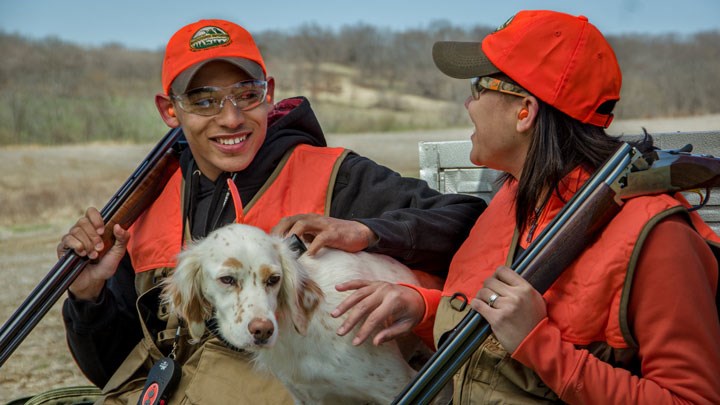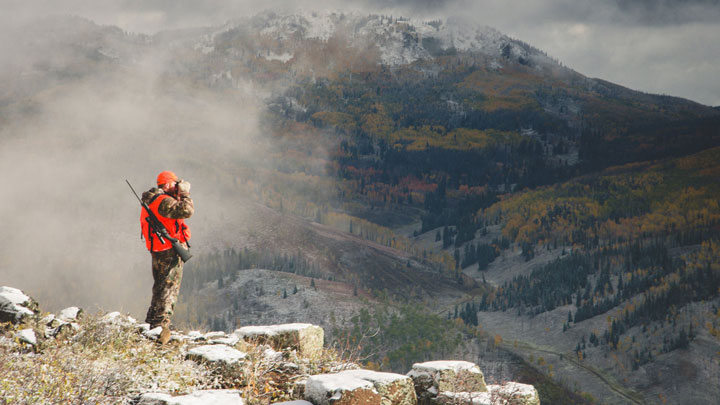
by Darron McDougal - Friday, June 5, 2020

Imagine it: If someone who hasn’t been exposed to hunting tunes in to a hunting show or watches a few hunting videos on YouTube, how will they view hunting after the show ends? Most TV shows and videos portray hunting accurately and tastefully, but others represent it poorly and in ways that are off-putting not only to non-hunters, but also to the hunting community.
Now, suppose that same person asked you why you hunt. Are you prepared for that conversation? What would you say? Would your response engage this non-hunter through positive messaging or turn him or her away from it?
With challenges already stacked against hunting participation and hunter numbers in decline as documented by this website and others, we can’t risk sending non-hunters the wrong message. Every moment we’re given to discuss hunting with someone or portray it through media or social media is an opportunity to share the role of legal, regulated hunting, and we must accurately represent hunting in that moment. That’s the best way to ensure hunters and hunting maintain a good reputation. Following are a few key points to consider when such opportunities arise.
Things to Avoid
One thing people often do is gawk over a turkey’s spurs or beard length or a big-game animal’s antlers, etc. While it is natural to admire the special aspects of game you harvest, they must not be your sole focus. If they are, non-hunters could get the wrong impression and think you are not also, and most importantly, hunting for the meat whether for yourself or to share it with others. They won’t know otherwise unless we show and tell them.
To expand on that point, hunters must support the taking of any legally hunted buck or bull, regardless of its size. Hunting is not all about antlers, for example. We hunters have different goals and reasons for why we hunt. And while I’m not saying that you must agree with what every hunter harvests, please keep your opinions and any less-than-positive comments to yourself. To diminish someone else’s harvest contradicts what hunting is about and why we hunt in the first place. Hunters make up a community. Putting up walls within our community will divide us. We need no divisions.
Swearing with regard to a game animal also sickens me. I mentioned in a previous NRA Hunters’ Leadership Forum website article that whenever I’m watching YouTube videos and the hunter refers to an animal as an expletive, I watch something else. These God-created, free-ranging creatures deserve our best, and calling them insulting names is intolerable and disrespectful. Terms like whacked or smoked in reference to a well-placed hit also don’t sit well with me. Instead, as I also noted in that previous article, give thanks for the animal and the meat it provides.
I’ve seen just enough disrespectful activity in hunting camps, sporting goods stores and on social media from everyday hunters who aren’t “hunting celebrities” to be concerned. If you think you aren’t impacting anyone because you’re not well-known, think again. Someone is watching, and what you say and do is the example they hear and see. What example are you setting?
Points to Emphasize
The No. 1 reason I hunt is to obtain meat. Aside from an occasional restaurant meal, my wife and I fill our freezers with wild-game meat. Each trip to the freezer reminds us of a successful hunt, but more importantly, it instills peace of mind. We know where the meat came from, how it was harvested and handled, and by whom it was cooked and prepared. There are no assembly lines, dirty surfaces, antibiotics or anything unnatural. Those are good points to share with non-hunters.
Another good point is that hunting unites family and friends, or at least it should. Some folks make it a competition. While a little friendly competition is okay, communicate how spending time with family and friends is a big part of the American hunting tradition that we must keep alive for future generations.
Spending time outdoors to unplug and decompress from a hectic work and family life is another good point to discuss with non-hunters. Sitting in a treestand or sneaking along the rim of a prairie draw is a great way to evade the hustle and bustle and live in the moment. The wild is a great place to escape. Most people need the release it provides. Hunting is a great excuse to be outdoors.

When I classify hunting, I personally do not refer to it as a sport, hobby or pastime. I classify it as a lifestyle. And for me, it is a healthy lifestyle. It creates many attributes that I use in other parts of my life. Hunting forces me to prepare. It pushes me to think and strategize. It causes me to make decisions. It leads me to analyze circumstances and determine possible outcomes and consequences. All these things apply to everyday life. I guess you could say hunting builds character.
Finally, hunting is wildlife conservation’s largest component. Without legal, regulated hunting, wildlife habitat and game populations would suffer. Hunting generates so much money that is used to help wildlife not just survive but thrive. Hunting also provides a wildlife management benefit, too. For example, in areas where game populations are exploding, wildlife agencies have a close eye on everything and can increase harvest objectives. Likewise, when populations are decreasing, they can decrease harvest objectives accordingly to ensure healthy populations. Without hunters’ dollars that are earmarked for wildlife conservation, wildlife’s future would be grim.
For a non-hunter looking into our world, it is important that they see a proper perspective of hunting. Upstanding, all-American hunters do not hunt purely for an animal’s antlers. We do not cut other hunters down for what they harvest. We do not drop expletives in reference to the game we are hunting. We are not rowdy, bloodthirsty killers. We are the opposite of those things.
Communications efforts promoting the above points go far in reaching non-hunters. In addition, as this website and NRA’s American Hunter point out, messaging that supports hunter ethics, explains that hunting is not poaching and uses effective imagery and an emotional component go far in building support for legal, regulated hunting.
Sending the right message about hunting is the standard we all must strive for, regardless of whether it is through media, social media or in person. The question is this: What message are you sending?
The NRA Hunters' Leadership Forum website covers news relevant to hunters on the local, national and international fronts. We track how hunters' dollars are spent and we celebrate our long and rich hunting tradition, exposing those who seek to destroy it. Follow NRAHLF.org on Twitter @HuntersLead.
About the Author
Darron McDougal is a full-time freelance outdoor writer and editor who lives in Antigo, Wisc., with his wife, Becca. He has hunted in 12 states and successfully taken elk, bear, hogs, turkeys, pronghorn, whitetail deer and mule deer, most with archery equipment on DIY hunts. The McDougals enjoy all things hunting and shooting. They believe in God and love to travel.
E-mail your comments/questions about this site to:
[email protected]
